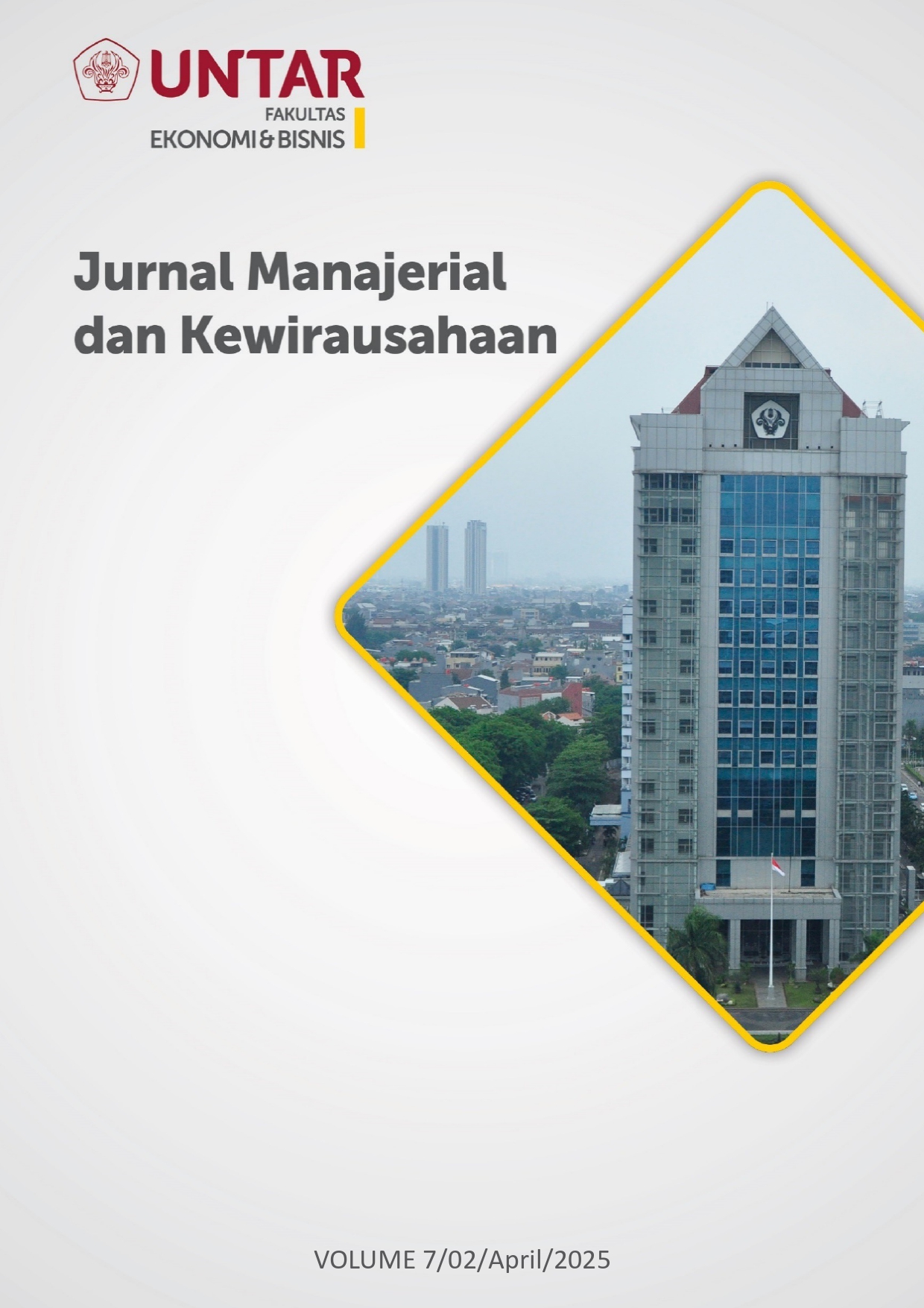Faktor-Faktor yang Memengaruhi Intensi Berwirausaha pada Mahasiswa Universitas Swasta di Jakarta
Main Article Content
Abstract
This research aims to test and determine the influence of self-efficacy, motivation and family support on entrepreneurial intentions among private university students in Jakarta and to test entrepreneurship education as a mediator between self-efficacy, motivation and family support and entrepreneurial intentions. The research method used was a quantitative approach by collecting data from 208 respondents who were active students from private universities in Jakarta. In this research, sample selection was carried out through non-probability sampling using purposive sampling techniques. Data analysis was carried out using the PLS-SEM method using SmartPLS version 4.0 software. The results of this research are that self-efficacy has a positive and significant influence on entrepreneurial intentions, motivation has a positive and significant influence on entrepreneurial intentions, family support has a positive and significant influence on entrepreneurial intentions, entrepreneurship education has a positive and significant influence on entrepreneurial intentions, self-efficacy has a positive and significant influence towards entrepreneurship education, motivation has a positive and significant influence on entrepreneurship education, family support has a positive and significant influence on entrepreneurship education, entrepreneurship education does not have a significant influence in mediating the relationship between self-efficacy and entrepreneurial intention, entrepreneurship education has a significant influence in mediating motivation with intention entrepreneurship, and entrepreneurship education do not have a significant influence in mediating the relationship between family support and entrepreneurial intentions.
Article Details
Section

This work is licensed under a Creative Commons Attribution-NonCommercial-ShareAlike 4.0 International License.
This work is licensed under a Jurnal Muara Ilmu Ekonomi dan Bisnis Creative Commons Attribution-ShareAlike 4.0 International License.,/p>
References
Ajzen, I. (1991). The theory of planned behavior. Organizational Behavior and Human Decision Processes, 50(2), 179-211. https://doi.org/10.1016/0749-5978(91)90020-T
Asmuruf, T. A., & Soelaiman, L. (2022). Entrepreneurship intentions among vocational school students in Sorong Regency - West Papua. Dalam Proceedings of the 3rd Tarumanagara International Conference on the Applications of Social Sciences and Humanities, 1301-1306. https://doi.org/10.2991/assehr.k.220404.208
Cui, J., & Bell, R. (2022). Behavioural entrepreneurial mindset: how entrepreneurial education activity impacts entrepreneurial intention and behaviour. International Journal of Management Education, 20(2), 100639. https://doi.org/10.1016/j.ijme.2022.100639
DetikEdu. (2023). Biang Keladi Lulusan Perguruan Tinggi Masih Banyak yang Nganggur. Diakses September 20, 2023, dari DetikJabar: https://bit.ly/48KyLAK
Duong, C. D., dan Vu, N. X. (2023). Entrepreneurial Education and Intention: Fear of Failure, Self-Efficacy and Gender. Journal of Small Business and Enterprise Development, 1462-6004. https://doi.org/10.1108/JSBED-02-2023-0057
Hamid, R. S., dan Anwar, S. M. (2019). Structural Equation Modeling (SEM) Berbasis Varian: Konsep Dasar dan Aplikasi Program Smart PLS 3.2.8. Dalam Riset Bisnis. Jakarta: PT Inkubator Penulis Indonesia.
Harahap, M. A. K., et al. (2023). Analyse the Role of Family in Entrepreneurship Education: Effective Support and Assistance. Journal on Education, 5(4), 14563- 14570.
Hassan, A., et al. (2020). Entrepreneurial Intention of Indian University Students: The Role of Opportunity Recognition and Entrepreneurship Education. Education and Training, 62(7/8), 843-861. https://doi.org/10.1108/ET-02-2020-0033
Martínez-Gregorio, S., L. Badenes-Ribera, L., dan Oliver, A. (2021). Effect of Entrepreneurship Education on Entrepreneurship Intention and Related Outcomes In Educational Contexts: A Meta-Analysis. International Journal of Management Education, 19(3), 100545. https://doi.org/10.1016/j.ijme.2021.100545
Metty, P. F., & Slamet, F. (2023). Pengaruh pendidikan kewirausahaan terhadap intensi berwirausaha pada mahasiswa universitas swasta di Jakarta Barat: efikasi diri dan motivasi sebagai variabel mediasi. Jurnal Manajerial dan Kewirausahaan, 5(3), 697-707. https://doi.org/10.24912/jmk.v5i3.25410
Paliwal, M., et al. (2022). Assessing the Role of Creativity and Motivation to Measure Entrepreneurial Education and Entrepreneurial Intention. International Journal of Educational Management, 36(5), 854-874. https://doi.org/10.1108/IJEM-05-2021-0178
Pham, H. H., dan Le, T. L. (2023). Entrepreneurial Education and Entrepreneurial Intention Among Higher Education Students in Vietnam: Do Entrepreneurial Self-Efficacy and Family Support Matter? Higher Education, Skills and Work-Based Learning, 13(2), 403-422. https://doi.org/10.1108/HESWBL-10-2022-0213
Saoula, O., et al. (2023). Do Entrepreneurial Self-Efficacy, Entrepreneurial Motivation, and Family Support Enhance Entrepreneurial Intention? The Mediating Role of Entrepreneurial Education. Asia Pacific Journal of Innovation and Entrepreneurship, 17(1), 20-45. https://doi.org/10.1108/APJIE-06-2022-0055
Saptowalyono, C. A. (2022). Suntikkan Optimisme, Presiden Jokowi: Selalu Ada Peluang di Setiap Kesulitan. Diakses October 18, 2023, dari Kompas.id: https://www.kompas.id/baca/ekonomi/2022/08/23/suntikkan-optimisme-presiden-jokowi-selalu-ada-peluang-di-setiap-kesulitan
Shen, T., Settles, A. M., dan Osorio, A. E. (2017). Does Family Support Matter? The Influence of Support Factors on Entrepreneurial Attitudes and Intentions of College Students. Academy of Entrepreneurship Journal, 23(1), 24-43. http://dx.doi.org/10.5465/AMBPP.2017.10901abstract
Soelaiman, L., Puspitowati, I., & Selamat, F. (2022). Peran model panutan terhadap intensi berwirausaha mahasiswa melalui penerapan teori perilaku terencana. Jurnal Muara Ilmu Ekonomi dan Bisnis, 6(2), 320-329. https://doi.org/10.24912/jmieb.v6i2.20387
Trading Economics. (2023). Indonesia Unemployment Rate. https://tradingeconomics.com/indonesia/unemployment-rate

